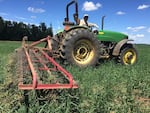
Jason Hunton farms organic and conventional land in Junction City, Oregon. He points out a successful organic wheat crop.
Courtney Flatt
This spring has been strange in Oregon’s Lane County.
“It rained every day. I’m exaggerating, but only by two days,” said farmer Jason Hunton.
As Mother Nature reared her ugly head, Hunton had to sit and watch his fields. Hunton farms organic and conventional land in Junction City, Oregon.
“You can see if you look really closely, here’s some thistle. We’re struggling. We’ve got a couple of (organic) fields that have some real thistle problems. I want to get some tarps and solarize it — cover it up and see if we can get that to cook itself in some of the thicker areas,” Hunton said.
Thistle can be a real beast.
“If you’re doing it organically, it’s a fight,” he said.
Several fields down the road, Hunton has a tine weeder running through an organic wheat crop — it’s like a giant comb, scraping up the weeds and some bits of wheat along with it.

A farm worker runs a tine weeder on Jason Hunton's organic wheat crop. It’s like a giant comb, scraping up the weeds and some bits of wheat along with it.
Courtney Flatt
This is the third time Hunton has tine weeded this field this year. It’s an all-day job.
Compare that to his conventional wheat fields, where you can spray once and be done with it.
“We use a lot of steel and diesel to control weeds,” Hunton said. “It’s not easy being a farmer, but it’s easier being a conventional farmer.”
Hunton’s got few options in his toolbox. The diesel and steel. Walking away from a field. Or spraying it with herbicides. That’ll wipe out the weeds fastest. Then he’s got to wait up to three years to re-certify that field as organic.
Weed Issues Go Global
For Azure Standard — based in Oregon’s Sherman County — that third option, spraying, was out of the question.
The company wholeheartedly believes in organic food. David Stelzer, Azure Standard’s CEO, said an organic food option is a matter of life and death for people with certain diseases and sensitivities.
The farm's weeds — and how to better manage them — shone a global spotlight on the rural county this spring.
Azure Standard’s neighbors complained noxious weeds are encroaching on their property.
Bryan Cranston grows seed wheat across the road from Azure Standard. He said an errant noxious weed could cost him five years of higher profits on that field.
“These are bad weeds. They just take over,” Cranston said.
The weeds include rush skeleton, Canada thistle, bindweed, white top and diffuse knapweed.
Starting in 2006, the county sent Azure Standard weed violation notices. This year, the weed district stood its ground. They said the farm had to manage the spread of noxious weeds.
David Stelzer said he doesn’t want weeds either — but he doesn’t see it as a major issue like the county does.

About 300 people filled the bleachers at the Sherman County High School to discuss whether a large organic farm is letting its weeds spread onto neighboring property — and whether the government should do something about it.
Courtney Flatt
“I want to be able to knock them out, but I’d like to do it the right way. The last thing I want is to kill them with a deadly toxic chemical,” Stelzer said.
County officials sent a letter demanding the company take care of the weeds — authority typically used as a last resort. That's when the company posted two videos to Facebook.
The videos spread across the internet like, well, weeds. The county received more than 59,000 emailed comments — some from as far away as New Zealand. Before, the most comments they’d received on a single measure was something closer to five.
After a sometimes-contentious public meeting last month, the county and the company agreed to come up with an organic plan to better manage the weeds.
No Silver Bullet
It’s going to take a lot of work. There’s no silver bullet for organic farms.
Ian Burke is a professor of weed science at Washington State University.
“You have to be more persistent than the weeds, and we know they are really persistent,” Burke said.
He said organic dryland grains are particularly difficult when it comes to weed management — it’s hard to successfully farm more than about 100 acres.
“It’s all about having the people to be out there and be actively managing,” Burke said.
Without herbicides, it’s hard to spend the money and commit the time to managing a lot of acres by hand.
A Google search for hand weeding will turn up “the diversity of ways you can torture weeds with steel,” Burke said. Same goes for mechanical tools that follow tractors.
But, Burke said, many organic farmers have candidly told him they’d love an organically-acceptable herbicide that acted more like conventional sprays: killing the weeds easily and quickly.

Canada thistle, a noxious weed.
Flickr Creative Commons: Adriana W. Van Leeuwen
Two of the biggest problem weeds, he said: Canada thistle and field bindweed. That comes from personal experience and from farmer surveys. Burke said less common, but equally problematic: rush skeleton and hawkweeds.
“They’ll root to dozens of feet deep. I’ve got a picture of Canada thistle rooting through asphalt,” Burke said. “It’s an aggressively persistent weed. … It’s very difficult to make any headway once you get a weed like Canada thistle infestation. It’s a long, hard slog to get back to something like an acceptable population.”
And weed scientists don’t even really know what an “acceptable population” looks like, he said.
Keeping Noxious Weeds Under Control
Legally, noxious weeds have to be managed properly.
No one in Oregon can quite remember a situation like what happened at Azure Standard.
Tim Butler is the noxious weed control program manager for the Oregon Department of Agriculture.
“Organic operations — and conventional operations — they have responsibilities as far as being good stewards and managing their land to keep these noxious weeds under control,” Butler said. “The weeds can make impacts on agriculture and natural resources as a whole.”
Officials said they’re happy with the final weed control plan, which allows Azure Standard to “use whatever methods they see fit to achieve control on all properties managed by them in Sherman County.”
It also allows weed district officials to monitor the company’s fields for noxious weed seeds that could be blown by the wind onto neighboring farms. Azure Standard will work to reduce its noxious weed populations each year.
Weed experts say it will take years. Azure Standard did not respond to requests for comment about the final plan.
Oregon Tilth, an organic certification company, conducted a national survey of farmers that found weed management is the main challenge to overcome while transitioning to organic fields.
“One thing about organic management systems: the longer you stay at it, the more you learn and the better you get,” said Chris Schreiner, executive director of Oregon Tilth.
Beating Back The Weeds
That’s been farmer Jason Hunton’s strategy. He transitioned six acres to organic in 2009. Now he has roughly 300 acres of organic crops.

A road serves as a barrier between Jason Hunton's two of organic and conventional fields.
Courtney Flatt
“OK, this one’s working,” Hunton said as he looked out over a green organic wheat crop. “It’s easy to get embarrassed because you’re always looking at your neighbors thinking, ‘Oh that looks good.’ Or, ‘They didn’t do that right, but I did it worse.’
“Then you find something you can take some pride in and think, ‘That looks good. I hope everybody sees this in addition to the goof up,’” Hunton said.
He said there’s instant gratification in a job well done. And even though he feels for Azure Standard’s thistle issues — he said his own problem field is “blowing up” with thistles — Hunton said it’s about respecting neighbors.
“I don’t want my problem to be his,” Hunton said.
And maybe one day weed management will be easier. WSU’s Ian Burke said the future may be in tech.
“I have high hopes for robotics,” Burke said.
In fact, the inventor of the Roomba (the robot that vacuums your floors) has already built the Tetrill, a weed-cutting bot aimed at organic home gardeners. Right now, it's scheduled for release in spring 2018.
“People are thinking about weeds and weed management in ways that are pretty innovative and unique, based on technology we’ve never had available to us before,” Burke said.
